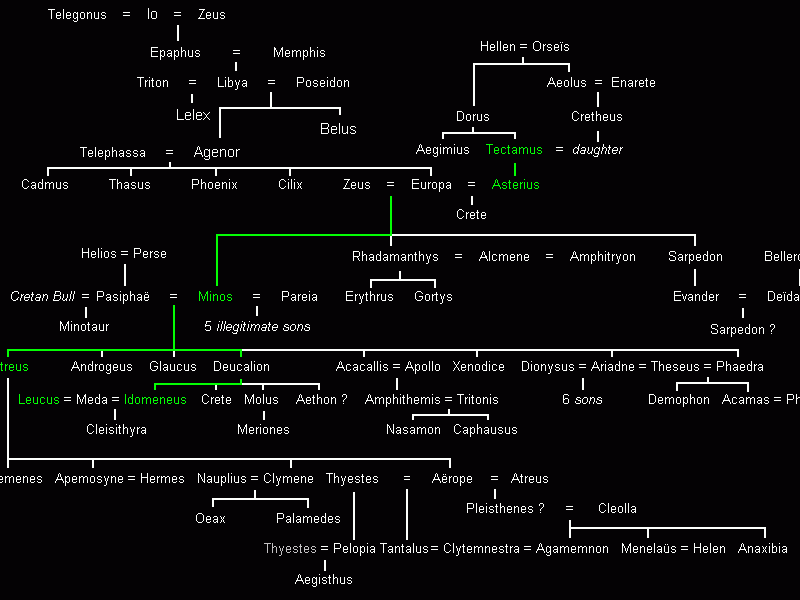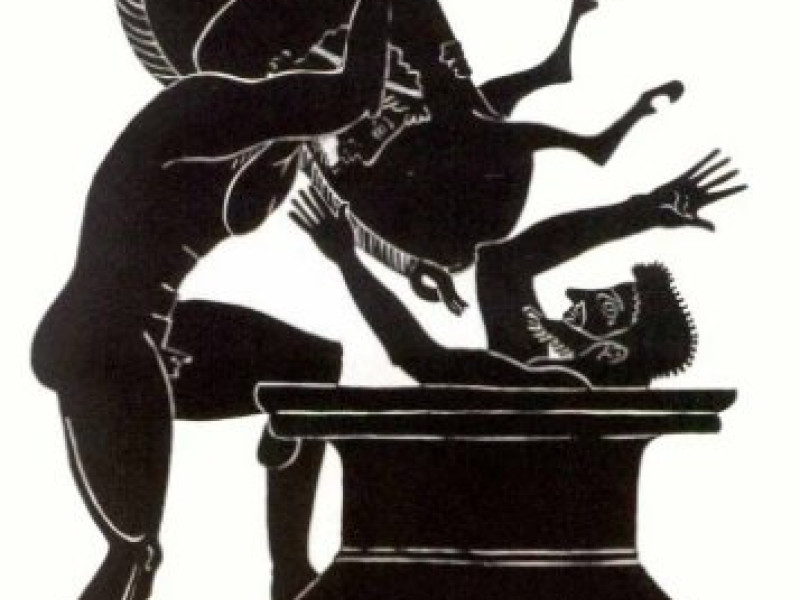Creon
Ruler and regent of Thebes. Creon (Κρέων) was the son of Menoeceus. Creon was a descendant of the Sparti.
He was also the brother of Jocasta or Epicasta, who was first married to Laius, king of Thebes. Creon was married to Eurydice, and became the father of Megara, Menoeceus and two sons who were both named Haemon.
When Laius was killed on the way from Delphi by a stranger, Oedipus became the new king of Thebes. When Creon was ruling as a king in his own right, he acted as either as a regent to young kings or as a chief adviser. In such plays as Sophocles' Oedipus in Colonus or Antigone, he was portrayed as a cruel tyrant.
However, Creon said he would give up the throne to anyone who could answer the riddle of the Sphinx.
The Sphinx was a monstrous offspring of Typhon and Echidna, with the head and bust of a woman, and with a lion's body and the wings of an eagle. The Sphinx would kill anyone travelling along the road pass at Mount Phicium, north of Thebes, who could not answer her riddle. Among those killed by the Sphinx was the elder Haemon. A stranger successfully answered the Sphinx's riddle, after which she destroyed herself.
Creon stepped down from the throne in favour of the stranger, named Oedipus, marrying his widowed sister to the new king of Thebes. Creon, his sister and everyone else, including Oedipus, didn't realise that their new king had killed his own father and married his own mother, thereby fulfilling the prophecy from Delphi, which both Laius and Oedipus had tried to avoid.
Oedipus had unwittingly begotten children through incest with his mother, and he became the father of Eteocles, Polyneices, Ismene and Antigone.
Oedipus ruled as a wise and just king, but when he discovered that he was the murderer of his father and had committed incest with his mother, he gouged out his own eyes. Either Creon or the people of Thebes banished the blind king from the kingdom. With Oedipus in Colonus, Creon abducted Antigone, Oedipus' daughter, trying to force him to favour Eteocles in the war against Oedipus' other son, Polyneices.
During the war of Argos, the Theban seer Teiresias said that the only way to win the war was that Creon must allow his son Menoeceus to be sacrificed before the altar of Ares. Creon refused to kill his son. Young Menoeceus, however, took his own life, so that Thebes would win the war.
When Thebes was victorious, Creon acted again as regent to Laodamas, the young son of Eteocles. Creon then brought further tragedy to his own family when he arrogantly decreed that the bodies of the seven Argive leaders and that of his own nephew, Polyneices, should be left to rot and for the vultures to feed upon. When Antigone pleaded with Creon to allow her brother to be buried, not only did Creon refuse, but decreed that he would sentence anyone to death who gave them a decent funeral. Clearly, Creon had broken the divine law by giving such commandment.
Antigone defiantly buried her brother in a secret location, but she was caught. The younger Haemon, Creon's own son, pleaded mercy on Antigone's behalf, because they were betrothed. Creon ignored his son's plea, and sentenced that Antigone should be buried alive. Anguished over Antigone's death, Haemon committed suicide. Creon's wife, Eurydice, blaming and cursing him for their son's death, hanged herself, completing the tragedy in Creon's own family.
Adrastus, the king of Argos and the only surviving leader of the Seven, went to Athens as suppliant to Theseus. Theseus commanded the Athenian army that defeated Thebes and forced Creon to give up the bodies of the Seven for funeral and burial.
See the Seven Against Thebes.
It was around about this time, when Creon was ruling Thebes, that Amphitryon fled from Tiryns when he accidentally killed his father-in-law, Electryon, king of Tiryns and Mycenae. Amphitryon married Alcmene, Electryon's daughter. Creon aided Amphitryon in the war against the Taphian pirates.
During Amphitryon's absence, Zeus visited and slept with Alcmene, disguised as Alcmene's husband. Alcmene then slept with her real husband, so that she became pregnant with twins – Heracles and Iphicles. One son belonged to Amphitryon, while the other son belonged to a god.
Heracles led a successful rebellion against Erginus, the Minyan king of Orchomenus. Creon rewarded Heracles by marrying his daughter Megara to the young hero. Heracles and Megara had three sons named Therimachus, Deicoon and Creontiades.
The goddess Hera hated her stepson, Heracles, so she struck him with a sudden fit of madness, causing Heracles to kill his own sons. Some said that he also killed his wife as well. It was for this crime that Heracles left Thebes forever, and went to Tiryns to serve his cousin Eurystheus. He performed twelve impossible tasks, which earned him immortality at the end of his mortal life. See Heracles.
According to a different source, Thebes was invaded by the Euboeans under the leadership of Lycus. Creon was thought to have died at the hand of Lycus. His death was avenged by Heracles. His nephew Laodamas became king at Creon's death. Laodamas lost the kingdom in the war against the Epigoni, the sons of the Seven. Thersander (Θέρσανδρος), son of Polyneices, became king at the time of the Trojan War. See Epigoni and After the War.
Related Information
Name
Creon.
Related Articles
Laius, Jocasta, Oedipus, Eteocles, Polyneices, Antigone, Adrastus, Theseus. Sphinx.
See also Seven Against Thebes.
Genealogy: House of Thebes.
By Jimmy Joe




